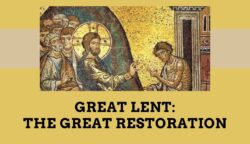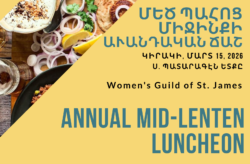The Sacrament of Holy Matrimony
Holy Matrimony is a sacrament of the Armenian Church in which a man and a woman solemnly vow before Christ, the priest, and the congregation to be true to each other for life. Their conjugal union is blessed by Christ through the Church.
The marriage of the Armenian Church is steeped in ritual and symbolism. Each of the acts that is performed during the ceremony has a special meaning and significance, after being blessed by the priest, rings are exchanged between the bride and the groom, thus giving expression to the fact that the spouses in marriage will constantly be complementing each other. During the exchange of vows and later in the service, the right hands of the bride and groom are joined to symbolize the “oneness” of the couple.
The climax of the wedding service is the rite of crowning. The crowns are the signs of the glory and honor with which God crowns them during the sacrament. The three colors in the crowns, white, green and red symbolize respectively, the purity with which the couple approaches the sacrament, the life that the spouses are starting together and the sacrifice each is expected to make. The groom and the bride are crowned as the kind and the queen of their own little kingdom, the home, which they will rule with wisdom, justice, integrity and loyalty. The rite of crowning is followed by the blessing of the cup of wine in remembrance of the marriage at Cana of Galilee, which was blessed by Christ’s presence. The sharing of the cup of wine serves to impress upon the couple that from that moment on they will share everything in life, joys as well as sorrows.
At the end of the service the priest blesses the couple, asking Christ to “protect them under the wings of your holy and venerable cross in peace.” Thus God’s grace is imparted to them to live together in His love, mutually fulfilling and perfecting each other. WHAT YOU NEED TO KNOW
The decision to marry is one of the most important and irrevocable decisions one will make in life. To make a permanent and lifelong decision to make a commitment of love cannot be made lightly. Hopefully you have made your decision after careful consideration of all the questions and issues that are the foundations of a good marriage. When you and your future spouse are ready make your commitment of love before the Holy Altar and before the people of God, here are some steps to help you get there.
- Call the priest as soon as possible to arrange for a date. This should be done before any other arrangements are made, since there are some days and periods during the liturgical year when the sacrament of matrimony may not be administered. The priest will help you in setting a suitable date, and will make arrangements for an introductory premarital consultation.
- The sacrament of marriage is available only to baptized members of the Church. The baptismal certificates of both individuals may be needed, unless they are found in the local parish registry.
- If one of the intended spouses is not a Christian, the sacrament of marriage cannot be administered. The priest will explain what options may be available to the couple.
- If one of the spouses is not an Orthodox Christian, it is advisable that he/she consider the possibility of being received into the communion of the Armenian Orthodox Church. The Priest will explain how this can be done.
- If one or both of the intended spouses has been divorced legally, a copy of his/her court verdict must be submitted to the priest, who, after discussing the matter with the individuals, will petition the Diocesan Primate for a special dispensation to administer the Church’s Holy Sacrament.
- The Ceremony of Holy Matrimony must be administered in the Church. The use of a non-Orthodox church or the home or any other facility may be considered only if there is no Armenian Church within a reasonable travelling distance and only after a special dispensation is obtained from the Diocesan Primate.
- A marriage license must be obtained. Call the town hall or county clerk’s office of your residence for the requirements. The marriage license must be presented to the priest before the wedding.
- If the family or the intended couple wishes the attendance of any clergy, Armenian or non-Armenian, the invitation to participate in the liturgy must be extended by the parish priest. He also determines the extent of the participation of the guest clergy. Requests of attendance and participation by others are usually accommodated without any problems. However, there may be some applicable guidelines that the priest may have to consider in trying to accommodate the request.
- The bestman, called Brother-in-the-Cross or Khacheghpayr in Armenian, and the maid/matron of honor must be baptized Christians. Certain restrictions may apply. Other members of the bridal party do not have to be of the same faith.
- The priest will arrange for an organist, soloist and deacon. Discuss with the priest any special music you wish played prior to or after the conclusion of the matrimonial liturgy. The priest will advise you on appropriate music from the Armenian liturgical tradition. Bear in mind that the music and hymns in the ceremony itself cannot be changed or replaced.
- The wedding vows in the Armenian Church are included in the ceremony and they may not be replaced.
- Arrangements will be made for a rehearsal, at which all members of the bridal party must be present.
- It has become customary in recent years to have a printed explanation of the service distributed to the guests as they enter the church. The priest will advise you on the various formats available. If you plan to have an explanation or a program printed, please make sure the priest approves the contents before it goes to print. Printed explanation to the service with individualized information is available for a nominal cost.
- The priest will explain what, if any, restrictions apply for decorations, flower arrangements, photography and videography.
Service of Betrothal
In the Book of Rituals of the Armenian Church, there is an ancient service for the blessing engagement ring/s. It is a brief service called The Rite of Betrothal or Nishahndook in Armenian. When a couple wishes to get engaged formally, it is advisable to call the priest and make arrangements to have the ring/s blessed. The Service of Betrothal can be performed either privately or publicly, at a formal or informal setting, at home, in a reception hall, or at church.
The Armenian Orthodox Church teaches that only one marriage can fulfill the perfect sacramental union proclaimed by Christ. However, the tradition of the Church also includes provisions for a second marriage for people who have been unable to reach the ideal union as taught by Jesus.
In the days when church appointed marital courts and decided cases of matrimonial disharmony the number of divorces and annulments were few and far between. But now that civil courts have the jurisdiction to adjudicate and decide marital disputes the church accepts the verdict, albeit reluctantly, yet still maintains the authority of granting or denying permission for a second sacramental marriage.
A marriage would be invalid if:
- One of the spouses is already married.
- The wedding is done in secret, i.e. when the couple elopes and the priest marries them secretly. (Cannon 25 of St. Nersess the Graceful).
- The marriage was forcibly imposed on one or both spouses.
Donations and Honoraria
The administration of the sacraments is the essential mission of the Church. It is therefore against the most fundamental teachings of the Church to set fees or to charge for providing what our Lord Himself provided freely and commissioned the Church to provide the world in His name. However, it is also the obligation and the sacred responsibility of the faithful to make the necessary means available to the Church to continue her mission in this world. Very often people do not know what or how much to give when they received the gifts of the Church. Please click here for the list of suggested donations and honoraria.
If you can afford to give more than the suggested amount do so generously. If you are unable to give the suggested amount give as much as you can. If you cannot give at all you will not be denied the sacraments.
Grounds to Grow
The marital commitment of two people is more than a commitment to love one another for life. Family and friends are involved as “the people of God” to witness their vows. The decision to make their vows before the Altar of God and the priest indicates a commitment of faith. The choice of the Armenian Orthodox Church as the place where they face each other, our heavenly Father and our Lord Jesus Christ when they make their vows is needed a statement of faith that they will uphold the Christian faith and the Gospel of Jesus Christ in their lives in their relationship. And like many things in this world marriage cannot be lived in a vacuum. We need one another, our friends and family, the inspiration and support of our faith, and the Church as the field where the seeds of our commitment will blossom and grow. The Armenian Orthodox Church has been the source of inspiration and nurture for her children throughout centuries. Her apostolic and orthodox faith have nurtured souls and led them to eternal life and continues her mission today in our own lives. The couple is urged to contemplate their decision to get married in the Armenian Church, thus joining the innumerable souls who have practiced their Christian faith through the teachings, liturgies and traditions of the Armenian Church.
Schedule of suggested donations (download)
Click here to watch Video 1 about Holy Matriminy (in Armenian)
Click here to watch Video 2 about Holy Matriminy (in Armenian)













